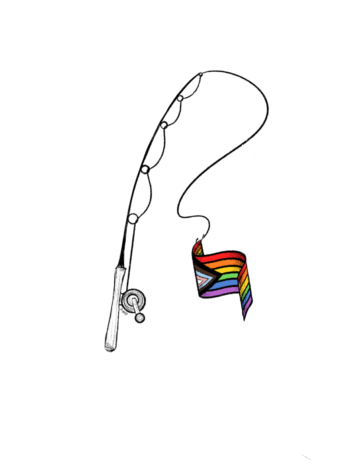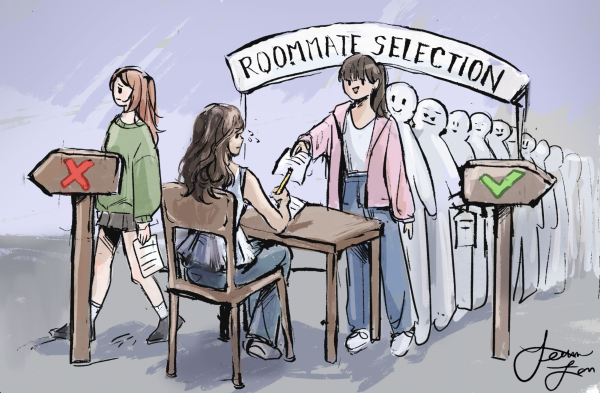Celebrities should not be forced to come out to fans
December 16, 2022

On Oct. 31, Netflix’s Heartstopper actor Kit Connor came out as bisexual on Twitter, telling his followers “congrats for forcing an 18-year-old to out himself.” The begrudging coming-out followed a wave of internet discourse in which fans of the LGBTQ+ teen romance show accused Connor of “queerbaiting” since he played a queer character while being, to their knowledge, straight. In reality, that term does not apply to Connor’s situation at all.
Dictionary.com defines queerbaiting as “the practice of implying non-heterosexual relationships or attraction (in a TV show, for example) to engage or attract an LGBTQ audience or otherwise generate interest without ever actually depicting such relationships or sexual interactions.” In other words, it’s often when TV writers build up chemistry and tension between two characters of the same sex, but never actually give them a romantic relationship on-screen.
This is often meant to encourage LGBTQ+ viewers to engage with the show by throwing hints of queerness that people in the community are often particularly observant of. The LGBTQ+ community has historically had very little representation in television and other media, and until the late 1990s all portrayals were very negative (as exemplified by a study from the University of Tennessee). Although this representation is steadily increasing, queer people still find it an uncommon joy to see themselves represented accurately in the media, which makes the practice of queerbating especially cruel.
On the other hand, denying true representation prevents actively homophobic people from turning off the television screen at the sight of, say, an actual gay kiss. This noncommittal toying with the idea of queerness helps producers maximize viewership and leaves LGBTQ+ viewers in the dust when searching for true representation in their favorite shows or other media.
A classic example of queerbaiting in fiction was when J.K. Rowling, author of the Harry Potter series, told media outlets in a press interview that supporting character Albus Dumbledore was gay, but then failed to so much as mention this in any of the books, almost as if she was shoehorning it in post-publishing. Additionally, the popular ABC show Once Upon a Time is known for queerbaiting viewers with main characters Emma Swan and Regina Mills, who raise Regina’s son together and have an intense enemies-to-friends relationship progression that many fans were led on to believe would become romantic (though it never did).
These instances involving characters and the withholding of LGBTQ+ representation in the media are real instances of queerbaiting, but a problem presents itself when people begin to accuse real people of the same offense. In the case of Kit Connor, some fans of the TV show Heartstopper claimed that since the actor played a bisexual character, and had not publicly come out as any orientation himself, his role as an actor was queerbaiting. This is problematic for several reasons.
First of all, demanding that someone come out publicly is an incredibly invasive thing to do. Sexual orientation is inherently personal, and people shouldn’t feel obligated to explain their identity to anyone, regardless of their public presence. There can be real consequences of coming out. In some places, coming out can be very dangerous, and that risk is something individuals must take on by choice.
Furthermore, acting is just that: acting. An actor playing a queer role does not need to be a queer person any more than an actor playing a 1940s military officer needs to be a 1940s military officer. Although it can be nice for the community to know that our experiences have been shared by the person on-screen, it’s not necessary for a queer person to be chosen for those roles, especially considering that some people may be queer or questioning their identity but are not out yet.
Pop singer-songwriter Billie Eilish was accused in the same vein as Kit Connor in 2021 when she released the music video for her single “Lost Cause,” which included her dancing with other girls. An instagram post related to the video also had the caption “i love girls,” and because Eilish did not disclose her sexual orientation afterward, some fans accused her of queerbaiting. Similar accusations have been made of pop singers Harry Styles and Taylor Swift, who have often presented their sexual orientations ambiguously in the media they release.
This interrogation of public figures about their identities is hypocritical. Our community claims to embrace those who choose not to label themselves, so why would we attempt to force others to explain who they are to us, much less in a way that is exposed to the entire world? We need to prioritize the right to privacy over queer representation from real people, which is only valid when it is offered voluntarily and wholeheartedly.
In fact, our end goal should be to normalize queerness to the extent that coming out can be more casual, and even unnecessary, rather than a definite prerequisite to being allowed to engage with the LGBTQ+ community.






